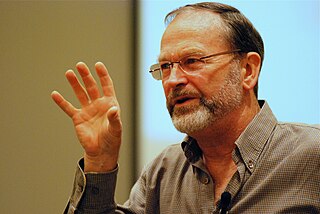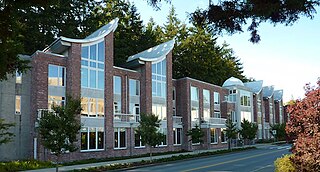
The University of British Columbia (UBC) is a public research university with campuses near Vancouver and in Kelowna in Canada. Established in 1908, it is the oldest university in British Columbia. With an annual research budget of $759 million, UBC funds over 8,000 projects a year.

William Rees, FRSC, is Professor Emeritus at the University of British Columbia and former director of the School of Community and Regional Planning (SCARP) at UBC.

The UBC Sauder School of Business is the business school of the University of British Columbia. The faculty is located in Vancouver on UBC's Point Grey campus and has a secondary teaching facility at UBC Robson Square downtown. UBC Sauder has been accredited by AACSB since 2003. The current Dean is Darren Dahl.
The University of British Columbia (UBC) is a Canadian public research university with campuses in Vancouver and Kelowna, British Columbia. The following is a list of faculties and schools at UBC.
The Institute of Asian Research (IAR) is a research institute founded in 1978 at the University of British Columbia (UBC). The institute conducts interdisciplinary research and teaching on multiple South Asian and East Asian nations.

The University of British Columbia Press is a university press that is part of the University of British Columbia. It is a mid-sized scholarly publisher, and the largest in Western Canada.
Bruno Freschi is a Canadian architect and an officer in the Order of Canada, known for his role as chief architect for Expo 86 in Vancouver, British Columbia, Canada. Some of his notable works include Science World in Vancouver, the Ismaili Centre in Burnaby, and the Staples Residence in Vancouver.

The Transition Program for Gifted Students, often called the University Transition Program (UTP), is an accelerated secondary school program for gifted students funded by the BC Ministry of Education's Provincial Resource Program with hosting, educational support and financial assistance from the University of British Columbia (UBC), and administered by the Vancouver School Board in Vancouver, British Columbia, Canada. Each year, the program accepts around 20 new students between the ages 12 and 15, half of which are from outside the Vancouver School Board. Over the course of two years, students complete required five year high school curriculum along with some university coursework. When they graduate from the program, the students are usually accepted into UBC earlier than they would if they had graduated from a regular high school.

The National Core for Neuroethics at the University of British Columbia was established in August 2007, with support from the Canadian Institutes of Health Research, the Institute of Mental Health and Addiction, the Canada Foundation for Innovation, the British Columbia Knowledge Development Fund, the Canada Research Chairs program, the UBC Brain Research Centre and the UBC Institute of Mental Health. Co-founded by Judy Illes and Peter Reiner, the Core studies neuroethics, with particular focus on ethics in neurodegenerative disease and regenerative medicine, international and cross-cultural challenges in brain research, neuroimaging and ethics, the neuroethics of enhancement, and personalized medicine.

Pacific Affairs (PA) is a Canadian peer-reviewed scholarly journal that publishes academic research on contemporary political, economic, and social issues in Asia and the Pacific. The journal was founded in 1926 as the newsletter for the entirety of the Institute of Pacific Relations (IPR). In May 1928, PA adopted its current name, and has been published continuously since. From 1934 to 1942, the journal was edited by Owen Lattimore, then William L. Holland.
Judy Illes,, PHD, FRSC, FCAHS, is Professor of Neurology and Distinguished University Scholar in Neuroethics at the University of British Columbia. She is Director of Neuroethics Canada at UBC, and faculty in the Brain Research Centre at UBC and at the Vancouver Coastal Health Research Institute. She also holds affiliate appointments in the School of Population and Public Health and the School of Journalism at UBC, and in the Department of Computer Science and Engineering at the University of Washington in Seattle, WA. USA. She was appointed a member of the Order of Canada in 2017.

The C. K. Choi Building is an educational building on the campus of the University of British Columbia (UBC) known for its sustainable design features.Named for businessman and philanthropist Dr. Cheung-Kok Choi, the building houses UBC's Institute of Asian Research. The architecture of the building implements Asian motifs.
The UBC Faculty of Medicine is the medical school of the University of British Columbia. It is one of 17 medical schools in Canada and the only one in the province of British Columbia. It has Canada's largest undergraduate medical education program and the fifth-largest in the U.S. and Canada. It is ranked as the 2nd best medical program in Canada by Maclean's, and 27th in the world by the 2017 QS World University Rankings.
The UBC Institute for the Oceans and Fisheries (IOF) is a research unit at the University of British Columbia (UBC) that was formed in 2015 by incorporating members from the former UBC Fisheries Centre, as well as a subset of researchers that are conducting marine related research at UBC. The IOF developed its own graduate program, which welcomed its first cohort of graduate students in September 2019. In addition to students of its OCF program, members are also drawn from other graduate programs at UBC, primarily from the Institute for Resources, Environment and Sustainability, the Departments of Earth, Ocean and Atmospheric Sciences, Zoology, Geography, and Botany, and the School of Public Policy and Global Affairs. The UBC Institute for the Oceans and Fisheries brings together a community of Canadian and international experts in ocean and freshwater species, systems, economics, and issues to provide new insights into how global marine systems function, and the impacts of human activity on those systems. It is working towards a world in which the oceans are healthy and their resources are used sustainably and equitably. IOF is located at The University of British Columbia, and promotes multidisciplinary study of aquatic ecosystems and broad-based collaboration with researchers, educators, maritime communities, government, NGOs, and other partners.

Paz Buttedahl was a Canadian professor at the University of British Columbia and Royal Roads University. She was a researcher and educator specializing in global education and international development issues. She was married to Knute Buttedahl and was the co-founder and president of Buttedahl R & D Associates (BRDA), based in Vancouver, British Columbia. She was also the founder and director of VIA - Vancouver Institute for the Americas, with a main campus in Vancouver and an overseas campus in Santiago, Chile. Buttedahl was a member of the World Academy of Art and Science and participated in the Peacebuilding Commission.
Knute Bjarne Buttedahl was a Canadian expert on global education and international development, and faculty professor of adult education at the University of British Columbia, in Vancouver BC, Canada. Buttedahl was a fellow of The World Academy of Art and Science (WAAS). In addition, he served as a project manager and field expert for the Canadian International Development Agency (CIDA), UNESCO Canada and UNICEF Canada; assisting initiatives in Africa, Asia and Latin America dedicated to Global citizenship education.
VIA Vancouver Institute for the Americas (1998–2007) was a Canadian organization of higher education dedicated to the research and projects implementation of Education for sustainable development centered in the academic integration of the Americas, under the guidance of the International Bureau of Education.
VIA operated from their main training center located at 470 Granville Street, Vancouver, in the province of British Columbia, and from their southern regional training center located at Las Condes, in Santiago, Chile. VIA was an organization incorporated in British Columbia, with a subsidiary registered in Santiago. VIA was an institute registered at the Ministry of Advanced Education of British Columbia as a provider of higher private education, allowing to provide accredited certifications and its programs qualified for provincial financial assistance and Canadian government scholarship programs.
Siwan Anderson is a Canadian economist and professor at the Vancouver School of Economics (VSE) at the University of British Columbia (UBC). Her area of focus is on development economics with a micro-level approach focusing on institutions in developing countries, and also gender economics focusing on the role of women in the economy. Siwan Anderson is also an Associate of the Canadian Institute for Advanced Research (CIFAR), an Associate of the Theoretical Research in Development Economics (ThReD), a Fellow of the Bureau for Research and Economic Analysis of Development (BREAD), and a Faculty Associate of the Center for Effective Global Action (CEGA). Siwan Anderson is the first woman to receive the John Rae Prize from the Canadian Economics Association.
Peter Busby is an architect and Managing Director at Perkins & Will Architects, with a background in philosophy and a history of advancing sustainable design. Throughout his career, he has advocated for sustainable building strategies and integrated green building infrastructure that serves to educate the users of his spaces.
Gina Suzanne Ogilvie is a Canadian global and public health physician. She is a Tier 1 Canada Research Chair in Global Control of HPV related diseases and prevention, and Professor at the University of British Columbia in their School of Population and Public Health.








